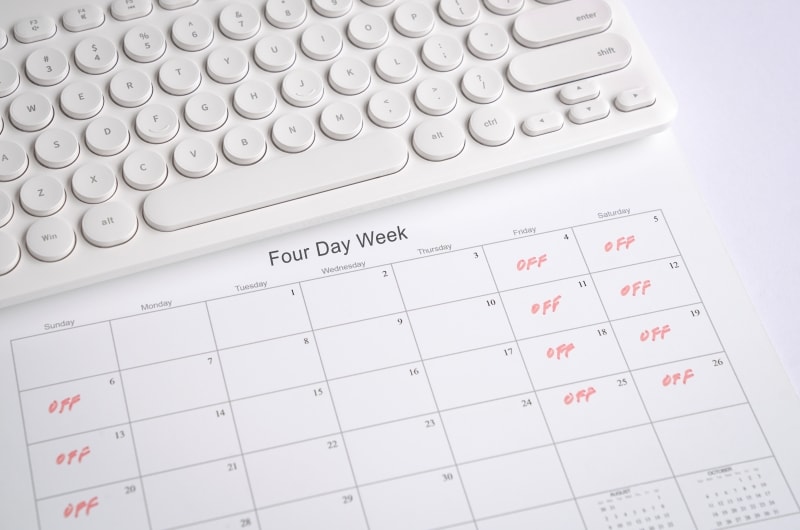Since time immemorial, humans have been toying with the idea of a four-day workweek. So contrary to popular belief, the concept is actually not new. It has been making the headlines in recent years, however, because countries across the globe have mounted successful experiments. Come to think of it, a three-day weekend with the same compensation sounds like heaven, right?
The pandemic has taught us many things—among these is that we shouldn’t be afraid of change in the workplace. No matter how radical it might sound, we would just know how it’ll be if we take the risk to try. Take for example the newfound acceptance for remote work. Many skeptics have come forward but bit their tongues after a successful year of working from home. Companies discovered that it’s possible. They were able to cut overhead costs and at the same time, breathe in a new dynamic to the workplace. In this digital age, we truly are more connected than ever in the sense that physical distance won’t be much of a problem.

A four-day workweek setup has not yet reached the ubiquity of remote work. But companies, willing to try it out, have proven that the idea is not farfetched and even improves the efficiency of employees. For example, New Zealand company Perpetual Guardian increased productivity by 20% for 8 weeks in 2018 after just declaring a four-day workweek. Microsoft Japan doubled the figure in 2019, after reportedly improving productivity by 40%. In March 2021, the Spanish government made a bold move. It will explore a four-day workweek through projects of around 200 companies that’d like to join. Iceland came bearing with great news last July 2022 when its trial for 2,500 workers was an overwhelming success. 85% of the country’s workforce now has three weekend days and two weekday nights a week. With all these developments, one thing is for sure, a four-day workweek is not impossible.

How It Works
Four-day workweeks do not only entail a simple announcement of another day of rest. The truth of the matter is it is only possible through a total change of existing systems that operate in the workplace.
ED lists three things to implement: 1) tighten meetings; 2) introduce “focus time” when everyone should concentrate on their key tasks for a period of time in a day, and 3) use technology more mindfully.
In a day, employees have to work in bursts of focused time that would mean having less relaxed hours daily but would be rewarded with more free time for passions, hobbies, and families outside of work. It entails cutting hours in a day without any work output or canceling meetings that don’t matter. It’s about utilizing technology and maximizing its benefits for improved efficiency.

Workplace Tip: One trend that has played a major part in making employees more efficient is ergonomics. The company FlexiSpot minimizes body pain or physical tension with its luxury ergonomic chairs that have comfortable seat cushions, breathable mesh backrests, and cushioned neck pads. It also has height adjustable standing desks and standing desk converters that allow employees to easily shift from sitting to standing positions. These make employees more alert and focused on the task at hand.

Why Give a Four-Day Work Week a Chance?
1. A four-day workweek will help employees become happier with the work that they do and at the same time, have more opportunities to bond with their loved ones.
Employees will have another day on the weekend to bond with family and friends and even have time left for self-care and reflection.
2. A four-day workweek lessens a company’s carbon footprint. Not only will costs be cut, so is the company’s carbon footprint. If many companies follow suit, this would mean a significant contribution to cutting energy use and curbing climate change. Aside from that, air pollution will also be cut with fewer workers going to and out of the office.
3. A four-day workweek increases efficiency. >Because short bursts of focused work are needed, an employee has a high motivation to finish work on time and/or even before the alarm clock rings. Knowing that there is an incentive to go home early and work only four days also improves efficiency throughout the day.
4. A four-day workweek may develop a healthier mindset for an employee towards time taken by work.
“Destructive creativity” occurs during burnouts so TED recommends a form of “sustainable creativity,” only achievable through a four-day setup. The mind needs time to recharge before it can perform at its optimal level

Disadvantages of a Four-Day Work Week
1. A four-day workweek will incur additional costs for the employer.
Contrary to what you might think, a four-day workweek can actually mean more expenses for the employer. New employees have to be hired to compensate for the work lost. This means new salaries and benefits to shoulder.
2. A four-day workweek may not work for every industry.
For example, if the company is in the customer service industry, cutting a day off might jeopardize the business’ image and relationship with its clients.
3. In some cases, a four-day workweek kills office culture. Employees spend less time with one another and with the time that they do spend together, they are actually really working instead of having casual chitchats.
4. A four-day workweek may also lead to more inequality. Blue-collar jobs and white-collar jobs require different hours. It also becomes tricky because the former is usually paid by the hour compared to the latter that gets paid by the output.
5. A four-day workweek may mean a harder team schedule to manage. To make up for a day lost, the manager will have to assign different days for workers to come in. It might be harder for him or her to manage schedules with different goals.
Final Thoughts
A four-day workweek may just be the future of the corporate world. Whether or not your company is open to adapting this”workplace solution,” the important thing is that employees are always treated with utmost kindness, fairness and humanity.